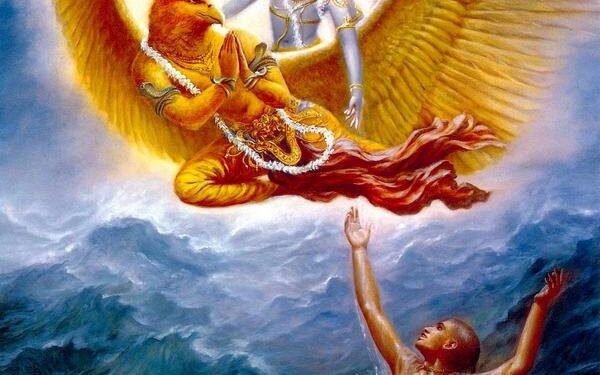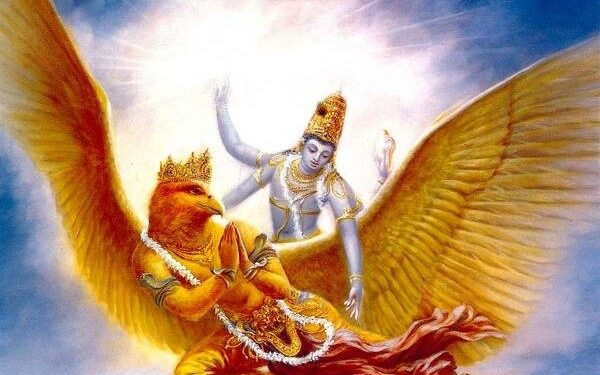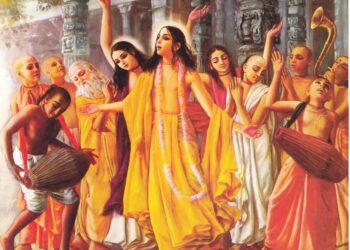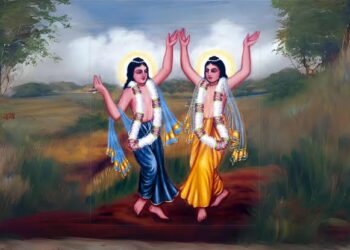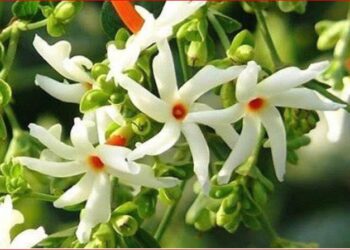1.114.31. These six things instill more vitality into the human organism: fresh melted butter, grapes, cohabitation with a woman in the prime of her youth; a milk diet, hot water and the shade of a spreading tree.
1.114.32. The water in a well, the shade of a banyan tree and the well-rounded breasts of a young woman – these three are warm in winter and cool in summer.
1.114.33. The three instantaneously invigorating things are: a young woman, oil bath and a wholesome food. The three instantaneously debilitating things are: a hazardous journey, sexual intercourse and fever.
1.114.34. Dry meat watered down with milk shall not be taken in the company of wife, friends or the king. If taken, an immediate separation from them is inevitable.
1.114.35. Goddess of wealth forsakes a man habitually wearing dirty clothes, allowing dirt to accumulate on the teeth, eating too much, habitually speaking harsh words and sleeping at sunrise and sunset, even if he happens to be Vishnu.
1.114.36. Cutting of grass frequently, writing on the ground with the toes, chafing of the feet, neglect of the cleaning of teeth, wearing dirty clothes, keeping the hair rough, sleeping at dawn and dusk, lying down naked, eating and laughing excessively, drumming on one’s own limbs or on the seat – these may destroy the affluence of even Lord Vishnu.
1.114.37. These six bring back one’s wealth long lost: keeping the head cleaned and washed, keeping the feet spotlessly pure, keeping the company of excellent women, taking food in limited quantities, lying on the bed without stripping and sexual intercourse excluding the festival nights.
1.114.38. Ill luck and misfortune can be warded off by wearing a flower on the head and especially the white one.
1.114.39. Ill luck frequently resides in the back shadow of a lamp, the shadow of a cot, the shadow of a seat and the water used by washermen.
1.114.40. The rays of the early morning sun, the column of smoke rising from a funeral pyre, intercourse with an old woman, very sour curd and the dust from a broom should not be resorted to by those who wish for longevity.
1.114.41. The dust of elephants, horses, chariots, grains and cows is auspicious. That from ass, camel, goat and sheep is inauspicious.
1.114.42. The dust of cows, the dust of grains and the dust from the limbs of one’s own son – these are very holy, they destroy even the great sins.
1.114.43. The dust of a goat, the dust of an ass and the dust from a broom – these are unholy and conducive great sin.
1.114.44. The wind blowing from the winnowing basket, the water dripping from the nails, the water from the cloth and pot used for bathing, the dust from the broom and the water dripping from hair – all these destroy merits previously acquired.
1.114.45. One shall never walk between two brahmanas, a brahmana and fire, a husband and wife, two masters, two horses and two bulls.
1.114.46. What wise man will have confidence in women, kings, fires, serpents, studies, the enemy, worldly enjoyment, etc.?
1.114.47. Do not trust the incredulous; do not place too much of confidence even in the trustworthy; there is a lurking danger in reposing trust; it may uproot one.
1.114.48. He who remains complacent after making peace with the enemy has actually gone to sleep atop the tree, he will wake up after his fall.
1.114.49. One should never be too soft nor too cruel in action. The soft would be crushed with the soft and the ruthless with the ruthless.
1.114.50. One should never be too straightforward nor too soft. Straight trees are cut in a forest and the crooked trees remain as they were.
1.114.51. Meritorious persons bow down like the fruit-laden trees. Dry trees and fools would rather break than bend at all.
1.114.52. Miseries come unsolicited; they go away as they come. Just as the cat pounces upon its prey, man seeking things shall pounce on happiness.
1.114.53. Riches go before and after the noble but not so in the case of ignoble. You can do as you please.
1.114.54. A counsel in six ears (discussed among three persons) is leaked out immediately; that in four ears is kept for some time but the one in two ears cannot be understood even by Brahma.
1.114.55. Of what avail is the cow which neither yields the milk nor becomes pregnant? Of what purpose is a son who is neither virtuous nor scholarly?
1.114.56. The whole family is lit up by a single good son endowed with learning, intelligence and valour like the sky with the moon.
1.114.57. The whole forest is rendered fragrant by a single tree in full bloom like the family by a virtuous son.
1.114.58. One good son alone is preferable to a hundred ones devoid of good qualities. The moon alone dispels darkness and not the stars in their thousands.
1.114.59. The son should be fondled for five years and thrashed for the next ten years; when he reaches the sixteenth year he should be treated like a friend.
1.114.60. You cannot find an enemy like a son – on being born the son takes away one’s wife [when a son is born mother’s attention is more to the son than to her husband]; while growing up he takes away wealth and if by chance he dies he takes away the life of the father, too.
1.114.61. In the world some men are like tigers with the mouth of a deer and some like deer with the mouth of a tiger. In order to know them fully distrust at every step is the only way.
1.114.62. There is only one fault in men of forbearance and patience. There is no second fault. People take him to be powerless.
1.114.63. All enjoyments are transitory. If this alone is permitted (it would have been better) that the inclinations of the skilful be unaffected towards their friends.
1.114.64. O Saunaka! When the father passes away, the eldest brother takes his place. He should maintain everyone being a father unto them.
1.114.65. He shall be impartial to his younger brothers and give them the same pleasures as they received from their father.
1.114.66. The collection of a number of even insignificant things may be terrific in their effect. A number of blades of grass twisted into a rope may be strong enough to bind even an elephant.
1.114.67. The man who robs someone though he uses the money to make a charitable gift goes to hell. The fruit of the meritorious deed goes to the original owner of the wealth.
1.114.68. Families are faced with fall by the destruction of temple property, looting of brahmanas and showing them disrespect.
1.114.69. Sages have prescribed expiatory rites for the slayer of a brahmana, a drinker of wine, a thief and a breaker of vows; but there is no atonement for an ungrateful wretch.
1.114.70. Gods and manes do not accept oblations of the mean-minded fellow who keeps a woman of low caste as his concubine, who is a slave to his wife and who allows his wife to enjoy the company of a paramour in his own house.



